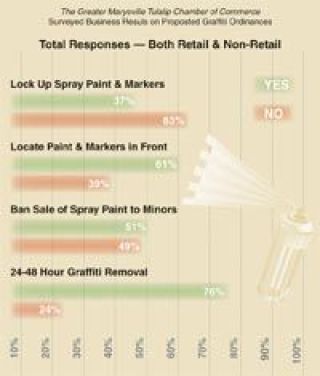MARYSVILLE The local business community is supporting this citys efforts to clamp down on vandalism and graffiti, with one important caveat: they want officials to rely on voluntary efforts to restrict the access to the tools of the trade.
As Marysville and the surrounding Snohomish County area weathers a storm of vandalism and graffiti, the town leaders have proposed tighter restrictions on how long property owners can leave tagging and other damage in place. The theory is that tagging left in place leads to more graffiti and current law allows property owners 30 days to clean it or cover it.
Under new legislation before the Marysville City Council that would be reduced to 96 hours: 48 hours to clean or cover, then a citation would be issued giving another 48 hours. At that time the city could clean or paint over the damage in most cases, and property owners could be fined $25 per day for every day they allow a graffiti nuisance property to exist.
Property owners will be notified by the city, either in person or by certified mail, and then the clock starts ticking, although exceptions can be made for unusual weather conditions. After the deadline the city can handle the problem itself and the proposed city ordinance gives workers authority to enter the property if necessary, with a court order, to abate the nuisance. The property owner can then be billed by the city for the materials and time needed to complete the work.
The ordinance describes the locations and placement of graffiti to include rocks and trees, and the markers include paint, ink, chalk and dye or similar substances. A graffiti nuisance property is just about anything where the two come into contact with each other. The ordinance defines indelible markers with a width of 4 mm or greater, a definition city attorney Grant Weed said he copied from similar laws in California.
The city has backed away from an idea that alarmed many business owners, the plan to require spray paint cans, wide-tipped markers and other tools of the vandals trade to be either locked up like cigarettes now are or to be located in conspicuous locations under constant observation. For many retailers that idea was DOA, as it would tie up some of their most expensive and productive real estate with little in return.
The Greater Marysville Tulalip Chamber of Commerce surveyed its 345 members and the lock-up was the worst idea, according to the 68 percent who responded. About 63 percent of those members said it was a bad idea; retailers shot it down at a ratio of more than three-to-one.
David Toyer is the chairman of the chambers government affairs committee and he said both the committee and the chamber board looked over the proposed legislation and suggested changes.
Theres just some additional things that we think need to be vetted out, Toyer said.
Their biggest sticking point is the definition of property owner. Many businesses lease their sites and property owners can be locals snow-birding in Arizona half the year or distant landlords who never visit in the first place. At a recent meeting of the citys graffiti task force one city worker said it took three weeks to get in touch with the Canadian owners of the Safeway Plaza on State Avenue. Toyer said the language in the proposed ordinance needs to reflect the fact that a tenant doesnt always have full control of the property he or she occupies. Many leases have different terms and businesses cant always spare a moment to find and contact their landlords.
Thats kind of a headache and a hassle for businesses, Toyer said.
He said the chamber is trying to work with the city and this isnt a business versus government confrontation. A key example is that the idea of restricting access to spray paint and markers is a non-starter, he added, since other jurisdictions would have to adopt the same laws.
Youre basically moving the problem from one area to another, Toyer said, adding that a voluntary compliance is more palatable to his peers. The proposed ordinance makes a request for voluntary restriction with the Council to revisit the issue after a year. For some of our retail businesses that the chamber represents, wed like some more time to look at that.
The Marysville City Council will discuss the graffiti ordinance revisions at its Feb. 12 meeting at Marysville City Hall, 1049 State Ave. The proposed ordinance can be found online at www.ci.marysville.wa.us/government/ccagenda.htm.
City, businesses team up to fight graffiti
MARYSVILLE The local business community is supporting this citys efforts to clamp down on vandalism and graffiti, with one important caveat: they want officials to rely on voluntary efforts to restrict the access to the tools of the trade.



